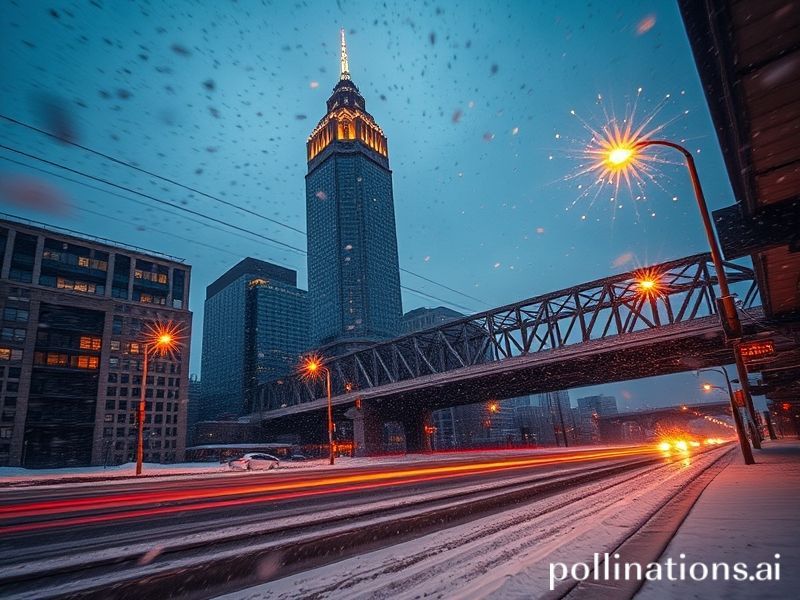Blizzards Over Brussels: How Cleveland’s Weather Quietly Shapes the World Economy
The Global Importance of Cleveland’s Cloud: Why Lake Erie’s Mood Swings Matter to Mongolia
By “Storm-Chasing” Correspondent, Dave’s Locker Foreign Desk
CLEVELAND—From the vantage point of Ulan Bator, a city whose own winters can kill a yak at twenty paces, Cleveland’s current weather is being monitored with the same solemn attention usually reserved for North Korean missile trajectories. Why? Because in the grand, rigged casino of global supply chains, Cleveland’s sky is the moody croupier flipping the cards that decide whether your Mongolian cashmere sweater arrives before Christmas or after the apocalypse.
Let us begin with the facts, because facts are the thin ice upon which reputations skate. This week, a modest Alberta Clipper—meteorological slang for “Canada’s passive-aggressive gift to the Midwest”—slammed into Lake Erie, which, unimpressed, responded with lake-effect snow so theatrical it could win a Cannes Palme d’Or for Best Supporting Blizzard. Flights out of Hopkins International were delayed just long enough for passengers to contemplate the existential dread printed on their boarding passes. Meanwhile, somewhere in Antwerp, a logistics algorithm spat out a red warning: “Cleveland—potential 14-hour ground stop—reroute via Memphis.” Thus, Belgian chocolates missed their connecting flight to Seoul, proving once again that the shortest path between two indulgences is a snow squall over Ohio.
Internationally, Cleveland’s weather has always punched above its weight class, like a middle-aged accountant who somehow keeps winning bar fights. The city sits at the nexus of the Great Lakes, the St. Lawrence Seaway, and the delusion that the Rust Belt is merely “between renaissances.” When the barometer drops, grain freighters bound for Nigeria sit idle, unable to slip under the icy bridges. Ukrainian corn rots in silos, and African bakers improvise with cassava, muttering darkly about “those frozen Great Lakes bastards.” The butterfly effect, but with more wind chill.
Climate scientists—whose funding depends on producing ever-grimmer PowerPoints—note that Cleveland’s winters are growing shorter yet angrier, a bit like Twitter arguments. Lake Erie no longer freezes as often, which sounds cheerful until you realize open water is a gigantic moisture cannon aimed at the eastern suburbs. The resulting snowbelts are now exporting white stuff to Canada, a reversal of the historic polite exchange of thank-yous and timber. Ottawa, not amused, has threatened retaliatory tariffs on Cleveland-made barometers, which nobody buys anyway.
The geopolitical subplot is equally frosty. China’s Belt and Road Initiative has no official Cleveland spur, yet COSCO shipping quietly tracks ice thickness here with the devotion of a teenager stalking an ex. Why? Because every ton of American soybeans delayed by a Midwestern blizzard is a ton Brazilian farmers can sell to Beijing at a premium. Somewhere in São Paulo, a commodities trader is toasting with a caipirinha to the “heroic snows of Ohio,” proving that gratitude, like snow, is highly localized.
Back on the ground, Clevelanders themselves display the stoic humor of a population that knows the world is laughing at them and has decided to laugh louder. Local radio hosts hold “Lake Effect Bingo,” where listeners win prizes if Painesville, Mentor, and Ashtabula all appear in the same sentence. The grand prize is a snowblower and a one-way ticket to Phoenix, though winners inevitably cash it in for a second snowblower. Human nature, like lake-effect snow, is beautifully predictable in its absurdity.
The broader significance? Simple. In an era when every city claims to be “smart,” Cleveland remains refreshingly honest: it is stupidly, gloriously atmospheric. Its weather reminds us that no blockchain, no drone, no TED Talk can reroute a low-pressure system. The planet still has veto power over human ambition, and it exercises that power most flamboyantly above the shores of a former industrial powerhouse that now exports snowstorms and existential humility.
So, as diplomats in Geneva argue over carbon credits and shipping magnates in Singapore refresh their weather apps, Cleveland keeps doing what it does best: being inconveniently cold, inconveniently relevant, and—if you squint through the sideways sleet—strangely beautiful. The world may pretend to care about the city’s sports teams or its comeback narrative, but deep down, what terrifies and thrills us all is the certainty that somewhere over Lake Erie, the next storm is already loading the dice.
And somewhere in Mongolia, a herder checks his phone, sees a blizzard alert for Cleveland, and quietly zips his cashmere-lined coat. The global village, it turns out, is just a collection of smaller villages shivering in sequence.







